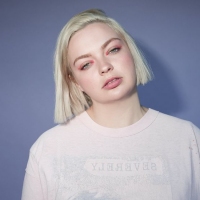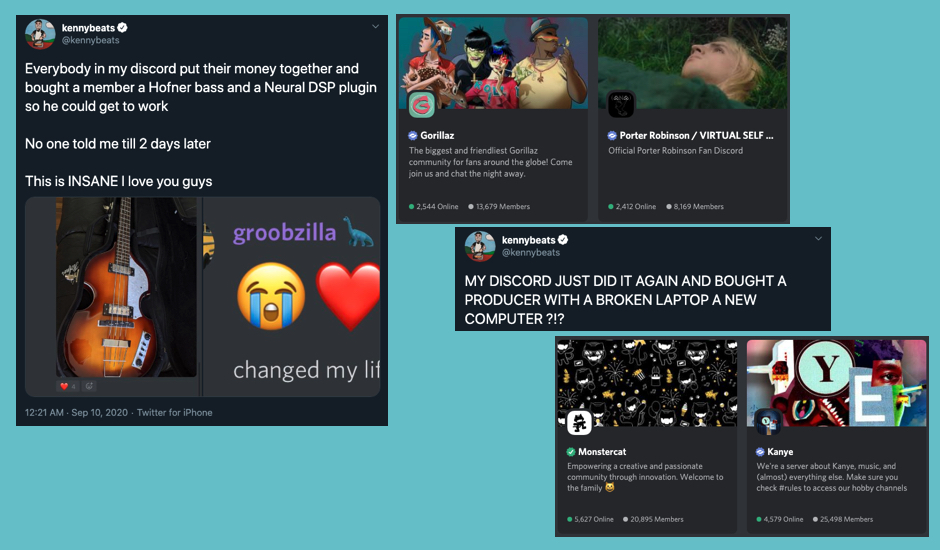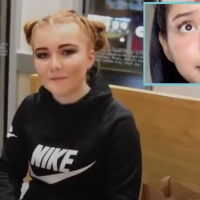 NZ pop break-out Navvy shares her fav up-and-coming New Zealand musical picksWith her second EP for the year in The Final Pieces, the rising New Zealand musician proves there's a lot to be excited about in not just her, but the future too.
NZ pop break-out Navvy shares her fav up-and-coming New Zealand musical picksWith her second EP for the year in The Final Pieces, the rising New Zealand musician proves there's a lot to be excited about in not just her, but the future too.

In the face of disruption, Discord is bringing musicians and fans closer together
Whether it’s fundraising equipment for producers affected by coronavirus or giving a platform for fans to connect without live shows, Discord is proving an incomparable platform in 2020.
For what was initially adopted as a messenger platform for gamers playing with one another online, Discord is proving an irreplaceable asset within music communities. After a surge in popularity in 2017, the platform - which allows multi-channel communication through audio and text, through separate, niche-specific chat servers - has grown into a multi-disciplinary hub with a core that expands beyond gaming; early non-video game-related servers climbing in popularity over the last three years particularly, as a mean of bringing together international fans of certain things - music, television, film, aesthetics, even porn - to create communities unrestricted by geographical boundaries.
Since then, music has been a key focus of Discord. Communities built around musical niches - specific popstars, genres and sub-genres, record labels, songwriting and production - grew from word-of-mouth and Reddit postings (and soon later, full websites that allow you to search for servers based off keywords), creating ecosystems that spanned continents and backgrounds. Discord, in turn, verified several servers and introduced things like musical bots, which allow participants to playlist music to be played on a server’s voice chat; a place that soon became a hub for the good (appreciative conversation, musical discussion, feedback) and the bad (music leaking, abuse).
In saying that, however, many of the musical Discord servers in 2017 were built and moderated by fans, and only a select few artists - often non-commercial, underground electronic musicians - were using it as a tool to interact and communicate with fans. At the time, nothing beat the ease and excitement of meeting fans at a live show, especially for those that sold meet-and-greet add-ons to tickets as a way to further increase profits while creating incomparable experiences for fans that would solidify their appreciation of the artist for far longer (as long as the interaction was positive, of course).
Then, came coronavirus. In the wake of COVID-19 and the associated lockdowns and isolation, Discord has become a linking point for people to stay in touch with one another even without these mutual appreciations that often build the need for servers. Now, these communities are joined by extended family group chats, school classes, health providers and beyond. According to Google Trends, global Discord-related searches have near-quadrupled since 2017, and in Australia, Discord searches doubled within the space of a week in March, in-tune with the beginning of lockdowns nationally.
My point is, if you are spending your time on twitter, then you could also spend time on discord, where there are so many opportunities abound for beatmakers. Ppl collaborating, sharing, learning, etc. Mine is in my bio, @knxwledge @montebooker @devonwho have great ones as well
— Kiefer (@Kiefer_on_Keys) September 2, 2020
For the music industry, coronavirus completely wiped out live shows, and therefore, many of the fan-artist interactions methods that were often preferred in the past were effectively cancelled for the foreseeable future. And so, artists - and not just small, non-commercial ones - turned to Discord as a way to pass the extra time they’ve obtained in absence of touring, connect with fans that couldn’t meet them on the road in the process, and even share throwaway music they’d made over the years, in a way a little more incognito then sharing them straight to social media.
Last week, GRAMMY-winning hip-hop producer/songwriter Knxwledge - known for his work with Anderson .Paak, Joey Bada$$, Kendrick Lamar and Action Bronson - shared unreleased music to fans for free, through a dedicated Discord server. Meanwhile, fans of BTS have used Discord servers as a way to discuss buying strategies to further amplify the group’s latest single Dynamite and continue its Billboard #1 reign, often in secrecy to avoid rival stan communities from interfering, or starting similar strategies to bump them off the top position. US-based electronic/hip-hop events company Brownies & Lemonade started a Discord server for fans to connect outside of their gigs, only to be crashed by many high-profile producers that have played their shows in the past.
PC Music leader A.G. Cook has a Discord that’s proved crucial in his extended and often-confusing album roll-outs throughout the last few months, while Machinedrum, Jimmy Edgar, Flatbush Zombies and Bauuer have all recently established their own dedicated Discord servers, the musicians themselves often chiming in and sharing snippets of new material and other exclusives with their communities. Then, there are the musicians that emerge in servers not even about themselves exclusively: pop music-centric communities full of songwriters and cult-favourite pop stars alike; hip-hop servers laden with rappers big and small; electronic niches with guest appearances from nearly everyone (electronic musicians are the most prevalent on Discord, generally speaking).
One of Discord’s biggest - and most wholesome - adaptors is Kenny Beats, the go-to producer (in 2020, he’s produced released tracks by IDLES, Denzel Curry, slowthai, Benee and Dominic Fike alone, alongside past work with FKA twigs, Ed Sheeran, Rico Nasty, Vince Staples and so on) whose own Discord server became a hub for producers and songwriters wanting to carve themselves a similar trajectory to the production heavyweight. It’s a place where gunning producers often share tips and feedback with one another, building on demos as a collaborative community - including Kenny himself - that amplify and educate one another, with the hopes of standing out.
Last week, members of Kenny Beats’ Discord community - which also includes other producers and collaborators of Kenny’s from over the years - came together to buy an Australian member a new bass guitar - a high-end one, no less - and production plug-in so they could write the music they wanted, unbeknownst to the producer. Then, two days later, the community banded together again, raising almost USD$400 in ten minutes for a developing producer who couldn’t afford to get a new computer for production, as their limited income was going solely to bills.
Everybody in my discord put their money together and bought a member a Hofner bass and a Neural DSP plugin so he could get to work
— kennybeats (@kennybeats) September 9, 2020
No one told me till 2 days later
This is INSANE I love you guys pic.twitter.com/RjirxUlbao
Although many of these Discord communities have been built as a response to coronavirus limiting real-life interactions, it’s becoming clear that these ecosystems are something which may long outlast the pandemic itself. A two-minute-long meet-and-greet with a pop musician is a snapshot often never to be repeated; a Discord server - providing the musician is active - can allow fans to communicate with musicians for hours, multiple times. It’s helped bring musicians closer to their fans at a time you’d expect the opposite; welcoming a channel unrestricted by social media expectations and often, management teams. Artists have the space to be themselves, and encourage fans to meet and communicate with one another over shared interests - something that is near-impossible with geographics, and difficult to nurture and moderate on platforms like Facebook.
It should be no surprise then to see labels themselves starting to take advantage of Discord as a crucial release tool in coronavirus times. While many of the platform’s best moments come from authenticity, labels have begun to tap into Discord as a way to build dedicated fanbase ecosystems they can notify and push releases to with a simple ‘@’, or ‘reward’ fans with exclusive information hours before they’re pushed through artist socials - anything to make you feel closer to the artist, or more rewarded by being a fan of them.
However, as mentioned, Discord’s peaks thrive from genuine actions; its best moments stemming from musicians wanting to help up-and-comers out, or the communities they’re building amplifying one another in a safe, collaborative space that’s been missing for independent musicians long before coronavirus was even a thought, especially for those without the money and resources to chase their dream as an independent artist. Any opportunity to take advantage of that genuineness is likely to be shrugged away as soon as people catch on, and with a general interest into the music industry’s happenings increasing as musicians become more open and transparent, people are going to catch on quick.
All we have to hope is that in a post-coronavirus world, when artists have less time to build communities and communicate with fans, these ecosystems will continue to thrive.
You can create a Discord account and start exploring their communities here.
 NZ pop break-out Navvy shares her fav up-and-coming New Zealand musical picksWith her second EP for the year in The Final Pieces, the rising New Zealand musician proves there's a lot to be excited about in not just her, but the future too.
NZ pop break-out Navvy shares her fav up-and-coming New Zealand musical picksWith her second EP for the year in The Final Pieces, the rising New Zealand musician proves there's a lot to be excited about in not just her, but the future too.
 The (cooked) history of M to the B: UK grime diss turned TikTok memeOriginally going viral in 2016, the song was initially a diss between two rival grime rappers. Now, it’s the soundtrack to TikTok’s most-liked video.
The (cooked) history of M to the B: UK grime diss turned TikTok memeOriginally going viral in 2016, the song was initially a diss between two rival grime rappers. Now, it’s the soundtrack to TikTok’s most-liked video.